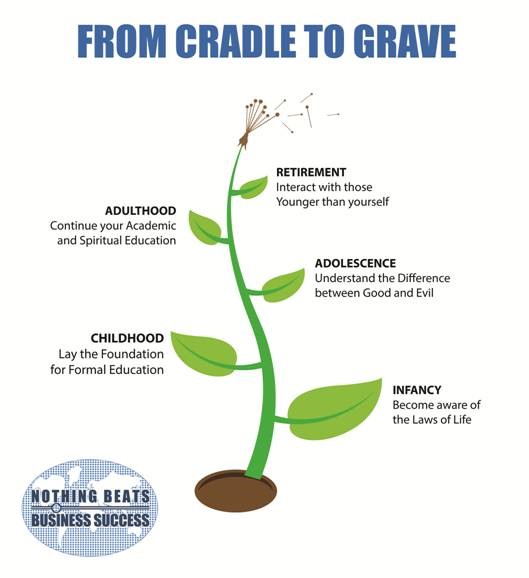“And be not conformed to this world: but be ye transformed by the renewing of your mind, that ye may prove what is that good, and acceptable, and perfect, will of God.” – Romans 12:2
Last week’s column fleshed out “The Power of Sharing” solution to Challenge # 5 – Financial Comfort, the fifth of eight challenges, as we commit to working smarter towards the benefits of holistic prosperity and happiness in 2018.
This week we propose “The From Cradle to Grave” solution to Challenge # 6 – Intellectual Stimulation.
Intellectual stimulation is an amalgam of activities, which build on our gene pool in the cradle, to put our minds in gear as we traverse the journey through life. As we nourish our brains with new knowledge and experiences (from the continual interaction with the influence of environmental factors), we prepare ourselves for our journey through life so that future generations can benefit from the seeds we scatter in our later years, and beyond the grave.
There are five stages that we sequentially travel – infancy, childhood, adolescence, adulthood and retirement. Technological tools, spawned in the information age with a rapid increase in sophistication, have had an impact on each of these stages and the wonders of discovery show no signs of abatement.
Infancy – Casual observation would lead us to believe that most animals are gifted at birth with apparent mature instincts. In a short time, they learn everything necessary for their survival, as well as how to relate to their environment and with other species. By contrast, we human beings, in infancy, are much more dependent on our parents and guardians to become aware of the Laws of Life.
Childhood – The foundation for formal academic and technical education is carefully laid through three stages: infancy (birth to 2 years old), early childhood (3 to 8 years old) and middle childhood (9 to 11 years old). For each stage there are well researched targets about physical development and mental agility which are carefully monitored, realizing full well that children may well reach these markers at different times.
Adolescence – As children become teenagers they build on the foundation and expand their knowledge base, while at the same time focusing on the kinds of physical changes of puberty. This is the period where they must learn well the difference between good and evil. If they are allowed to drop out of the formal system during this period, it could spell disaster for the rest of the society.
Adulthood – We often get a false sense of security when we ‘graduate’ from a formal academic or technical education. We need to adopt a philosophy that ‘graduation’ is only the beginning. We need to adopt a philosophy of continuing education, so that we can keep abreast of technology, and entrepreneurship, so that we can become an employer rather than the confinement of being an employee. Our spiritual education must be nourished – it is about being able to master the ability to communicate with God.
Retirement – This phase of life does not mean that your brain has stopped working and you must prepare for the departure lounge. It simply means that we must ‘retyre’, i.e. fit our bodies with new tyres to match the declining energy levels and keep our physical vehicles on the road. I am enjoying retirement. When I ask myself why, I always come up with the same answer – the opportunity to interact and share with those younger than myself.

Let us continually, from the cradle to the grave, formally and informally, be intellectually stimulated by new knowledge and experiences, facilitated by the smart tools of the information age for the ultimate benefit of mankind.
